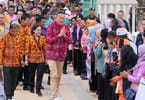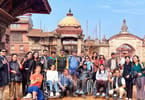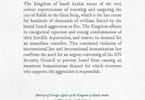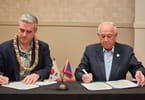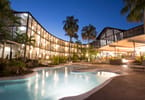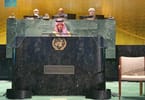Tourism makes up one-third of the economy of the Muslim country of Maldives, a country that markets itself as one of the world’s top luxury travel destinations. With its beautiful beaches and abundant marine wildlife, the Maldives welcomed close to 800,000 tourists in 2010. There are literally hundreds of multinational luxury resorts and hotels awaiting the traveler looking to be pampered.
In 2008, Maldives had its first ever-democratic elections, ending a 30-year dictatorship led by Maumoon Abdul Gayoom. After years of struggle, human rights abuses, and the absence of separation of powers and basic rights, the people of Maldives were at last given a new constitution, ensuring separation of powers and the right to choose their president for a 5-year term.
The new government of Maldives was 3.5 years into their term of government, institutionalizing democracy and reforming its economic and fiscal policies to allow greater redistribution of tourism revenues.
On February 7, 2012, Maldives President Mohamed Nasheed was overthrown by a coup d’état led by opposition parties and Islamist groups.
The opposition, influenced by the former regime and a few business tycoons, some members of the police and the military, staged a mutiny. They forced President Nasheed to resign and hand over power to Vice President Dr. Waheed. Nasheed’s supporters claim the President was forced to resign at gunpoint.
After his accession of power, Dr. Waheed sacked the entire government and formed a cabinet with ministers who had served the dictatorship of President Gayoom.
The government of Dr. Mohamed Waheed did not arrive in a smooth transition of power as it firstly emerged in the international media. The day after the coup, the people of Maldives rallied en-masse around deposed President Mohamed Nasheed in a peaceful demonstration in Malé. The police and the army violently repressed the demonstration by beating civilians, women, and the elderly, including members of leaders of the opposition, parliament, and the media. An arrest warrant has been issued against deposed President Nasheed, and Nasheed and leaders of the Maldivian Democratic Party (MDP) have been prevented from leaving the country.
It is strongly suspected that Mr. Gasim Ibrahim financed the coup; he was formerly the Finance Minister under the authoritarian government of Maumoon Abdul Gayoom, and founded his own political party when he ran in the 2008 presidential elections. He briefly entered the coalition government of Mohamed Nasheed and was elected parliament member in 2009, effectively blocking economic reforms conflicting with his business interests. He later became a member of the Judicial Service Commission (the body responsible to oversee the judiciary) to influence the third arm of democracy: the judiciary.
The British government issued a warning against non-essential travel to the island’s capital, Male, while noting there have been no reports of strike at the Male International Airport or at resorts. Australia and the United States have also issued travel advisories.
The UK organization, Friends of Maldives, believes travelers can safely visit the country as resorts are separate from the population and the capital. However, the people of Maldives are demonstrating every day for an early election. Although the demonstrations are occurring mainly in the capital Malé and the islands, visitors could face industrial actions, strikes, and other form of protests from the Maldivian staff working in resorts owned by business tycoons suspected to have financed the coup.
A top UN official, Oscar Fernandez-Taranco, arrived in the islands on Thursday for talks with government leaders and political parties. He said the world body wants to preserve “the democratic gains that have been made in the Maldives,” according to a statement from his office.
New President Waheed tried to assure citizens – and tourists – that the nation is safe and open for business. In a statement, he said differences among political parties and the public must be set aside for the sake of national unity.
The International Council of Tourism Partners (ICTP), an alliance of destinations that believes in green growth, does not want to go down the dangerous path of jumping into ‘political issues’ as distinct from ‘policy issues,’ however, it’s President, Geoffrey Lipman, can’t help but lament about what is happening in the Maldives.
He said: “I know President Nasheed, and he has been a global champion of the climate change issue, and as such, he certainly stands in the forefront of leaders who advocate transformation to the green economy. His vision for tourism and its role as an enabler of transformation is one that any believer in our sector has to embrace – sustainable growth with responsibility, in lockstep with carrying capacity and with full inclusion of the interest of local stakeholders.
“The eyes of the world will help keep the playing field level, which is what he’s calling for, and we will keep our eyes firmly fixed on what is happening and lend our voice to the calls for a fair democratic process.”
WHAT TO TAKE AWAY FROM THIS ARTICLE:
- After years of struggle, human rights abuses, and the absence of separation of powers and basic rights, the people of Maldives were at last given a new constitution, ensuring separation of powers and the right to choose their president for a 5-year term.
- The International Council of Tourism Partners (ICTP), an alliance of destinations that believes in green growth, does not want to go down the dangerous path of jumping into ‘political issues' as distinct from ‘policy issues,' however, it's President, Geoffrey Lipman, can’t help but lament about what is happening in the Maldives.
- Although the demonstrations are occurring mainly in the capital Malé and the islands, visitors could face industrial actions, strikes, and other form of protests from the Maldivian staff working in resorts owned by business tycoons suspected to have financed the coup.



